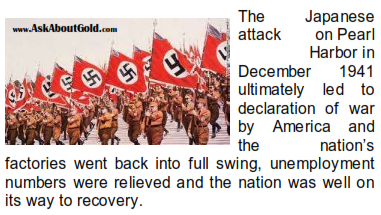The Great Depression
The Great Depression lasted from 1929-1939 and was the longest and darkest economic disaster of the world. It was a decade of hopelessness that left most filled with despair. Fueled in part by the infamous stock market crash of 1929, which wiped out millions of Wall Street investors, the downward spiral began in the U.S. and soon spread worldwide. Steep declines in industrial output and failing companies led to massive layoffs.
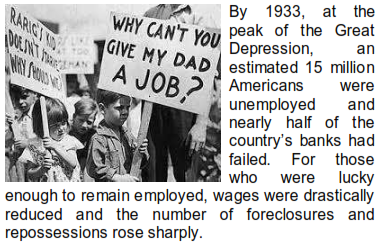
Adherence to the gold standard was the primary transmission vehicle of the Great Depression. Even countries that were stable were forced to join the deflationary policy since higher interest rates in countries that performed a deflationary policy led to a gold outflow in countries with lower interest rates. This effectively spread the Depression from the United States throughout the world, especially to Europe.
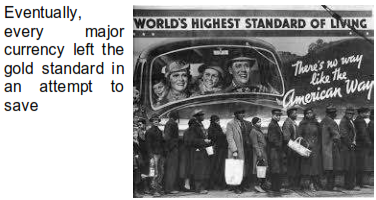
themselves. Great Britain, Japan, and the Scandinavian countries were the first to abandon ship in 1931. It would take up to five years for other countries to follow suit. Later analysis showed a direct correlation between the date a country deserted the gold standard and the date of its economic recovery.
For example, Great Britain leaving in 1931, recovered much earlier than France and Belgium, who didn't abdicate until much later.
Further exacerbation of the economic turmoil came in June 1930 when Congress approved the Smoot–Hawley Tariff Act which raised tariffs on thousands of imported items. The intent was to encourage the populace to purchase less expensive American-made products, raise revenue for the federal government and protect farmers. However, it backfired when, in retaliation, other countries increased tariffs on U.S. goods. This led to the decline of American exports by a whopping 60% and a loss of 1/3 of their value.
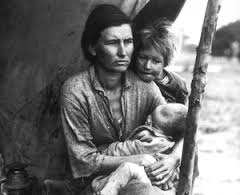
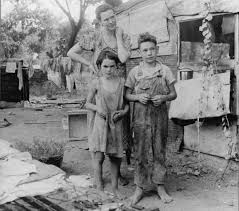
The hardest hit were farm commodities such as wheat, cotton, tobacco, and lumber. The farmers, already crippled from the technological advances of the 1920's and finding it impossible to withstand further losses, were forced to abandon their farms. There was a nationwide shortage of food and people everywhere were starving.
Despite avid assurances from President Herbert Hoover that the dire situation would blow over, matters continued to deteriorate. Largely due to, what some would say, Hoover’s halfhearted attempts to sway the market, Hoover apparently believed the government should avoid any intervention in the economy, and felt he did not have any responsibility to the American public to create employment or provide economic relief.
By 1932, about 15 million hardworking Americans were desperately seeking employment of any kind. Meanwhile, the country’s bread lines and soup kitchens were overflowing and the number of homeless “shanty towns” rose to preposterous levels. That year the American populace unanimously chose unemployed, Franklin D. Roosevelt to be their saviour.
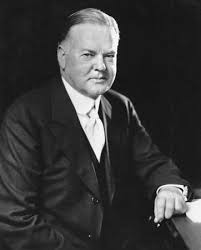
Hoover
During his first months in office, he adopted a governmental act known as “The New Deal” to pull America out of the long-standing economic atrocity. He brought about change in legislation meant to reform the economic system, stabilize production, create jobs and rebuild the lives and faith of U.S. citizens. However, even then, the New Deal did not entirely resolve the problem for the country.
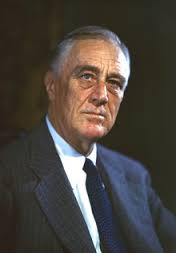
Roosevelt
A sharp recession hit in 1937, caused in part by the Federal Reserve’s decision to increase its requirements for money in reserve. There is criticism among renowned economists that the economic downturn would have been far less severe and much shorter had the Fed lowered interest rates, increased the monetary base, provided big banks with emergency funds and injected liquidity into the banking system to prevent it from crumbling. Instead, they passively allowed big banks to collapse, transforming a normal recession into the greatest depression of all time.
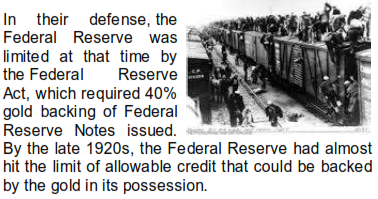
It was World War II that ultimately saved the country from this economic crisis. Depression-era destitution had fueled the fire of extremist political movements in various European countries, most notably that of Adolf Hitler’s Nazi regime in Germany. German oppression in 1939 led to war breaking out in Europe. Roosevelt’s declaration to support Britain and France in the campaign against Germany revived manufacturing, produced a flurry of private sector jobs and more importantly, gave the people back their passion.
